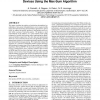Free Online Productivity Tools
i2Speak
i2Symbol
i2OCR
iTex2Img
iWeb2Print
iWeb2Shot
i2Type
iPdf2Split
iPdf2Merge
i2Bopomofo
i2Arabic
i2Style
i2Image
i2PDF
iLatex2Rtf
Sci2ools
121
Voted
ATAL
2008
Springer
2008
Springer
Decentralised coordination of low-power embedded devices using the max-sum algorithm
This paper considers the problem of performing decentralised coordination of low-power embedded devices (as is required within many environmental sensing and surveillance applications). Specifically, we address the generic problem of maximising social welfare within a group of interacting agents. We propose a novel representation of the problem, as a cyclic bipartite factor graph, composed of variable and function nodes (representing the agents' states and utilities respectively). We show that such representation allows us to use an extension of the max-sum algorithm to generate approximate solutions to this global optimisation problem through local decentralised message passing. We empirically evaluate this approach on a canonical coordination problem (graph colouring), and benchmark it against state of the art approximate and complete algorithms (DSA and DPOP). We show that our approach is robust to lossy communication, that it generates solutions closer to those of DPOP than D...
ATAL 2008 | Canonical Coordination Problem | Global Optimisation Problem | Intelligent Agents | Low-power Embedded Devices |
| Added | 12 Oct 2010 |
| Updated | 12 Oct 2010 |
| Type | Conference |
| Year | 2008 |
| Where | ATAL |
| Authors | Alessandro Farinelli, Alex Rogers, Adrian Petcu, Nicholas R. Jennings |
Comments (0)

